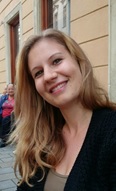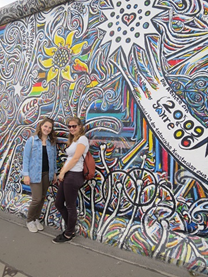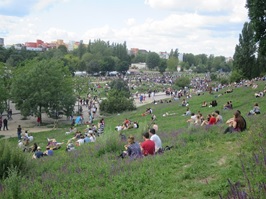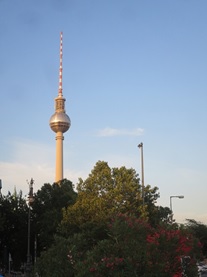 by Alina Wiedergut.
by Alina Wiedergut.
Motivation
Between my third and fourth year of medical school, I decided to apply for an internship at an emergency ward of the “Krankenhaus Köpenick” in Berlin, Germany. I chose Germany, because as an Austrian medical student I was very curious about working habits and teaching attitudes of our neighbour country. Furthermore, for me, Germany has always been one of those countries I could imagine myself doing my residency in. Therefore, I wanted to gather impressions and experience that would help me with my decision.
The Hospital
The hospital called “Krankenhaus Köpenick, DRK- Klinik Berlin” was built in 1914 and is located in the south east of Berlin, about 45 minutes from the city center. It is a clinic with 525 beds and 1200 staff members (200 doctors). It has a quite large emergency ward including several specialties such as internal medicine, trauma surgery, neurology and GYN/OB. It is one of the teaching hospitals of the Charité.
Application
The application process itself was uncomplicated. I applied about half a year before the internship started by sending my CV and letter of motivation per email. A few days later I received a positive response. There were a few administrative forms the hospital needed me to fill out (vaccination attestation, confirmation of enrollment, ÖH-insurance). The hospital sent those forms to me by mail. As in most European countries I was insured for liability and accidents via my home university, ÖH-Med. As I had to complete compulsory internships in Austria during that summer, I could only apply for 2 weeks, but I am quite sure that students can also stay for a longer period of time. The whole team is very excited about foreign students.
Hospital Routine and Internship
On my first day in the hospital I was welcomed by the student coordinator who was very helpful and hospitable throughout my whole internship. She gave me and the other students a tour around the hospital, organized our administrative stuff (lockers, hospital clothes, badges) and introduced us to the responsible mentors of our departments.

© Alina Wiedergut – Berlin Wall
The doctor shifts were from 8:00 am to 4:00 pm, from 3:00 pm to 11:00 pm and from 10:00 pm till 8:00 am. Usually they rotated weekly. This rotation system was new for me, as in Austria you have the short day/long day/25-hour shift system. Students could choose if they wanted to work in the morning or in the afternoon. I personally preferred the morning shifts as I wanted to use my free time to explore the amazing city of Berlin in the afternoon.
We were usually assigned to one doctor we shadowed all day. If there were exciting cases in other rooms, we could switch there. It was also possible to examine and interview our own patients, which were assigned to us by the responsible doctor. Afterwards we presented the case and talked about the treatment plan as well as therapy options.
There was a lunch break around noon, during which we could enjoy free food from the cafeteria. Most days at the ward were quite busy and students had a lot to see and to learn. On less stressful days, especially the residents were very motivated and enthusiastic about teaching. If there were no new patients, we were allowed to use a free room for studying and research. Sometimes they gave us “homework” to do a research on a certain topic we would talk about the next day. Unfortunately, there were no official teachings and lectures during my internship. However, the doctors made up for it by doing private teachings during the day.
To sum up, I had a really good time during my internship. I had the opportunity to work independently, got a lot of new impressions, got an insight into the German working attitude and felt welcome and respected.
With the experience I have now, I would really recommend going abroad for a month or more if possible. If you stay somewhere for a longer period of time, you really get to know your coworkers, they start trusting you and you can work more independently with patients.
Accommodation
I lived at a friend’s apartment close to the hospital (10 minutes by bus). Accommodation in Berlin is quite expensive. Therefore, I would recommend looking for a room as soon as you get your confirmation. In summer it’s easier, since there are always students who rent out their rooms for a few months. Furthermore, Airbnb and hostels are always an affordable option for a shorter period of time.
The City
Berlin is an amazing city. The public transport system is very good and you can reach all sights by train or metro. People are very friendly and if you get lost or have any questions, you can just ask anybody on the streets.
I can really recommend the “free walking tours Berlin”, where you have a tour guide showing you the city and explaining the history. These tours take place every two hours, starting in the city center (website below). There are different tours you can choose from, which are all very interesting. As the name implies, they are for free, although it is very common to tip the tour guide if he/she did a good job.

© Alina Wiedergut – Mauerpark
Furthermore, I would really recommend visiting the Mauerpark. It is a huge park with concerts, art shows, a huge flea market and a great flair. Especially in summer it is an amazing place to spend your free weekends in.
Berlin is also famous for its night life. There are many districts where you can go to bars and clubs. As there are so many options, I chose to book a pub crawl in the city center, which turned out to be a lot of fun (website below).

© Alina Wiedergut – Television Tower
Of course, the Brandenburger Tor, the Holocaust Memorial, a stroll along the Berlin Wall and the Television Tower should be on every tourist’s checklist. The city also has some very interesting museums, reappraising its history before and after the wall.
We also made a trip to Hamburg as it was only 3 hours by bus. So there is an endless number of free time activities in and around Berlin – it is definitely worth a trip.
Costs
Flight | 80 € (Vienna-Berlin) |
Accommodation | 200 € for 2 weeks |
Public transport | 30 € for 1 week |
Living costs | 200 € for food, drinks and activities |
Total | 510 € |
Interesting Websites
- ÖH-Med Wien: Viennese medical student interest group
- DRK Klinik Köpenick: DRK-Hospital Berlin
- New Europe Tours: Free walking tours in Berlin
- The Original Berlin Pub Crawl: Get to know the night life of Berlin

Citation:
Wiedergut, Alina: Clinical Internship Berlin (In: Polak, G. [ed.]: GI-Mail 02/20, ISSN: 2312-0827 Going International, Vienna 2020)
Here you can download this publication.
Published in GI-Mail 02/2020 (English edition).
- Do you already know our monthly newsletter GI-Mail with useful tips on postgraduate courses?
Sign up here. - Are you looking for vacancies or new career challenges? Here you will find the latest vacancies and job offers.
- Are you interested in up to date postgraduate courses and CME? In our education database »medicine & health« you will find new education events from over 2300 organizers.
